Berber-Led Argan Oil Sustainability Initiatives
Berber-Led Argan Oil Sustainability Initiatives

Amira Benhima
A passionate advocate for holistic wellness and natural beauty, is an accomplished author specializing in the benefits and uses of Argan oil, with years of experience exploring its wonders.
Key Takeaways
Imagine a world where the golden hues of the Argan tree vanish, leaving behind a barren desert landscape devoid of life. But amidst this potential tragedy, there is hope. Berber-Led Argan Oil Sustainability Initiatives have emerged as a beacon of environmental conservation and social empowerment. These initiatives not only protect the ancient Argania spinosa tree but also uplift local communities, particularly Berber women, through fair trade practices. So, what exactly are these initiatives and how do they ensure the preservation of this invaluable resource? Let’s delve into the world of Berber-Led Argan Oil Sustainability Initiatives and explore their impact on both the environment and the lives of those involved.
- Sustainable argan oil production empowers Berber women and provides economic independence.
- Conservation efforts protect the unique ecosystem of the Argan forest and prevent desertification.
- Argan oil sustainability provides economic benefits, empowers women, and supports community sustainability.
- Berber-led initiatives ensure fair trade practices and prioritize environmental conservation for long-term success.
Berber-Led Initiatives for Sustainable Argan Oil Production
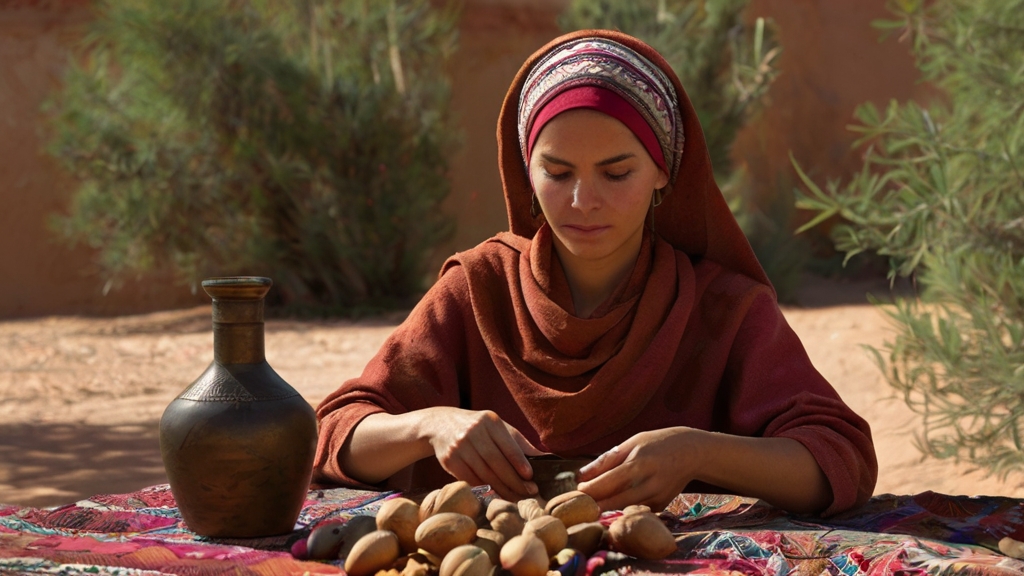
Berber-led initiatives in Morocco are driving sustainable argan oil production, ensuring the preservation of the unique ecosystem of the Argan forest. These initiatives empower Berber women through cooperatives, providing economic independence and social sustainability. Argan oil, derived from the kernels of the argan tree, is highly valued for its cosmetic and culinary uses. The Berber women have been extracting argan oil using traditional knowledge passed down through generations. By forming cooperatives, they have been able to collectively produce and market argan oil, enabling them to earn a fair income and improve their living conditions.
These cooperatives play a vital role in ensuring ethical practices in argan oil extraction, such as using hand-pressed methods and organic production. By adhering to fair trade principles, the Berber women are able to negotiate fair prices for their products, while also promoting transparency and sustainability in the industry. This not only benefits the Berber women economically, but also contributes to environmental conservation and biodiversity protection.
Through their involvement in argan oil production, Berber communities have become stewards of the Argan forest. They understand the importance of preserving this unique ecosystem and have implemented sustainable practices to ensure its longevity. By maintaining a balance between harvesting the argan fruits and protecting the trees, they have been able to safeguard the habitat of numerous plant and animal species that depend on the Argan forest for survival.
Furthermore, the participation of Berber communities in the argan oil industry promotes the preservation of traditional knowledge. This knowledge encompasses the techniques of argan oil extraction, as well as the cultural significance of the argan tree to the Berber people. By passing down these traditions, the Berber communities are not only preserving their heritage but also contributing to community development and empowerment.
Protecting the Argan Tree and Its Ecosystem

To ensure the sustainability of the Argan tree and its ecosystem, various conservation efforts have been implemented. These initiatives focus on preserving the unique ecosystem of the Argan forest and preventing soil erosion and desertification. Methods such as empowering local Berber women, preserving traditional knowledge, and implementing quality control measures are key in protecting the Argan tree and fostering community sustainability.
Tree Conservation Efforts
Efforts to protect the Argan tree and its ecosystem are essential for preserving the unique and vital role it plays in preventing desertification and supporting the livelihoods of millions of people in southern Morocco. The Argan tree, covering 800,000 hectares, acts as a natural barrier against the encroaching desert. Over 3 million people depend on the Argan tree ecosystem for their livelihoods, particularly Berber women who play a key role in harvesting Argan kernels. Conservation initiatives aim to address the threats of overexploitation and erosion that the Argan forest faces. These initiatives not only protect the tree itself but also preserve traditional knowledge, promote environmental sustainability, and empower local communities in Morocco. By supporting tree conservation, we can ensure the continued sustainability of the Argan tree and the well-being of those who rely on it.
Ecosystem Preservation Methods
Preserving the Argan tree and its ecosystem requires implementing effective methods for ecosystem preservation. Berber-led initiatives play a crucial role in protecting the Argan forest, which is not only important for the production of Argan oil but also for preventing soil erosion and desertification. The Argan forest covers over 800,000 hectares and supports the livelihoods of over 3 million people. By preserving this unique ecosystem, the initiatives contribute to environmental sustainability. Overexploitation and erosion have caused a decline in the Argan forest, making conservation efforts led by the Berber community even more vital. These initiatives empower Berber women and promote sustainable harvesting practices, ensuring the preservation of the Argan tree and its ecosystem for future generations. By supporting these efforts, we can help safeguard this precious resource and protect the environment.
Argan Tree Sustainability
With its vital role in preventing desertification and supporting the livelihoods of millions, the sustainability of the Argan tree and its ecosystem is of utmost importance. To ensure the long-term survival of this invaluable resource, several initiatives have been implemented:
- Sustainable harvesting practices: Berber women, who have been traditionally responsible for Argan oil production, use sustainable harvesting methods that prioritize the health of the trees and the surrounding ecosystem.
- Environmental conservation: Efforts are made to protect the Argan forest from overexploitation and erosion, safeguarding the biodiversity and ecological balance of the area.
- Community sustainability: The social and economic impact of Argan oil production empowers local Berber women and supports the development of sustainable communities.
- Social and economic impact: The production and sale of Argan oil provide income opportunities for Berber women, improving their quality of life and contributing to the local economy.
Sustainable Harvesting Practices in the Argan Oil Industry
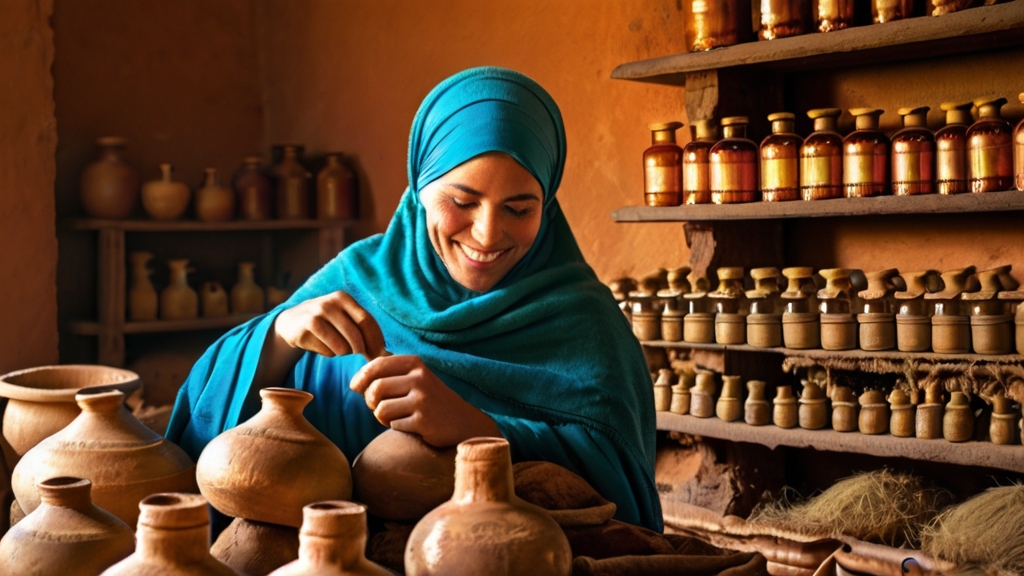
Sustainable harvesting practices play a crucial role in maintaining the ecological balance and preserving the argan forest in the Argan Oil industry. Berber women in Morocco, who are at the forefront of argan oil production, ensure sustainable harvesting practices. By adhering to these practices, they contribute to community sustainability and environmental conservation efforts.
The traditional method of collecting fallen argan fruits is a key aspect of sustainable harvesting. Instead of shaking the trees or using machinery, Berber women patiently wait for the fruits to naturally fall from the argan trees. This method not only protects the trees from damage but also allows for the selective collection of ripe fruits, leaving the unripe ones to mature.
To further prevent overexploitation, Berber-led initiatives focus on sustainable harvesting techniques. These techniques include hand-picking the fruits and manually cracking the nuts to extract the argan kernels. By avoiding excessive mechanization, the women ensure that the argan forest remains intact and undisturbed.
To highlight the importance of sustainable harvesting practices in the Argan Oil industry, let’s take a look at the table below:
| Sustainable Harvesting Practices | Benefits |
|---|---|
| Hand-harvesting of argan tree nuts | Protects the trees and prevents damage |
| Selective collection of ripe fruits | Allows unripe fruits to mature |
| Manual extraction of argan kernels | Preserves the argan forest |
Through their commitment to sustainable practices, Berber women play a crucial role in preserving the argan forest and supporting environmental conservation. By maintaining the ecological balance, they ensure the long-term sustainability of the argan oil industry for future generations.
Economic Benefits of Berber-Led Sustainability Initiatives

Are you interested in learning about the economic benefits of Berber-led sustainability initiatives in the argan oil industry? These initiatives have not only created job opportunities but also increased the income potential for over 600 Berber women in Morocco. By supporting local communities and providing economic independence, these initiatives have not only improved the lives of these women but also contributed to the preservation of the argan tree ecosystem.
Job Creation Opportunities
Berber-led argan oil sustainability initiatives in Morocco have created over 600 job opportunities for local Berber women, fostering economic independence and social environments within the industry. This has had a significant impact on the lives of these women, empowering them to support themselves and their families. The initiatives aim to preserve traditional knowledge and practices, recognizing the value they bring to the argan oil industry. By providing job opportunities, these initiatives contribute to the economic growth and sustainability of local communities. Additionally, they support the preservation of argan trees and the local ecosystem, ensuring the long-term viability of the industry. Through quality control and traceability measures, consumers can enjoy the full benefits of authentic argan oil while also supporting the empowerment of Berber women.
Increased Income Potential
With the implementation of Berber-led sustainability initiatives in the argan oil industry, local communities have experienced a significant increase in income potential. These initiatives have provided economic independence to Berber women, empowering them with sustainable livelihoods. Through fair trade practices and cooperative models, Berber-led initiatives ensure fair wages and equitable distribution of profits. The economic benefits of these initiatives have not only helped reduce poverty levels but have also improved the overall quality of life for Berber communities. By focusing on sustainable practices and community development, Berber-led initiatives have created long-term economic opportunities in the argan oil sector. This increased income potential has not only brought financial stability to local communities but has also empowered them to take control of their own economic future.
Empowering Women in the Argan Oil Industry
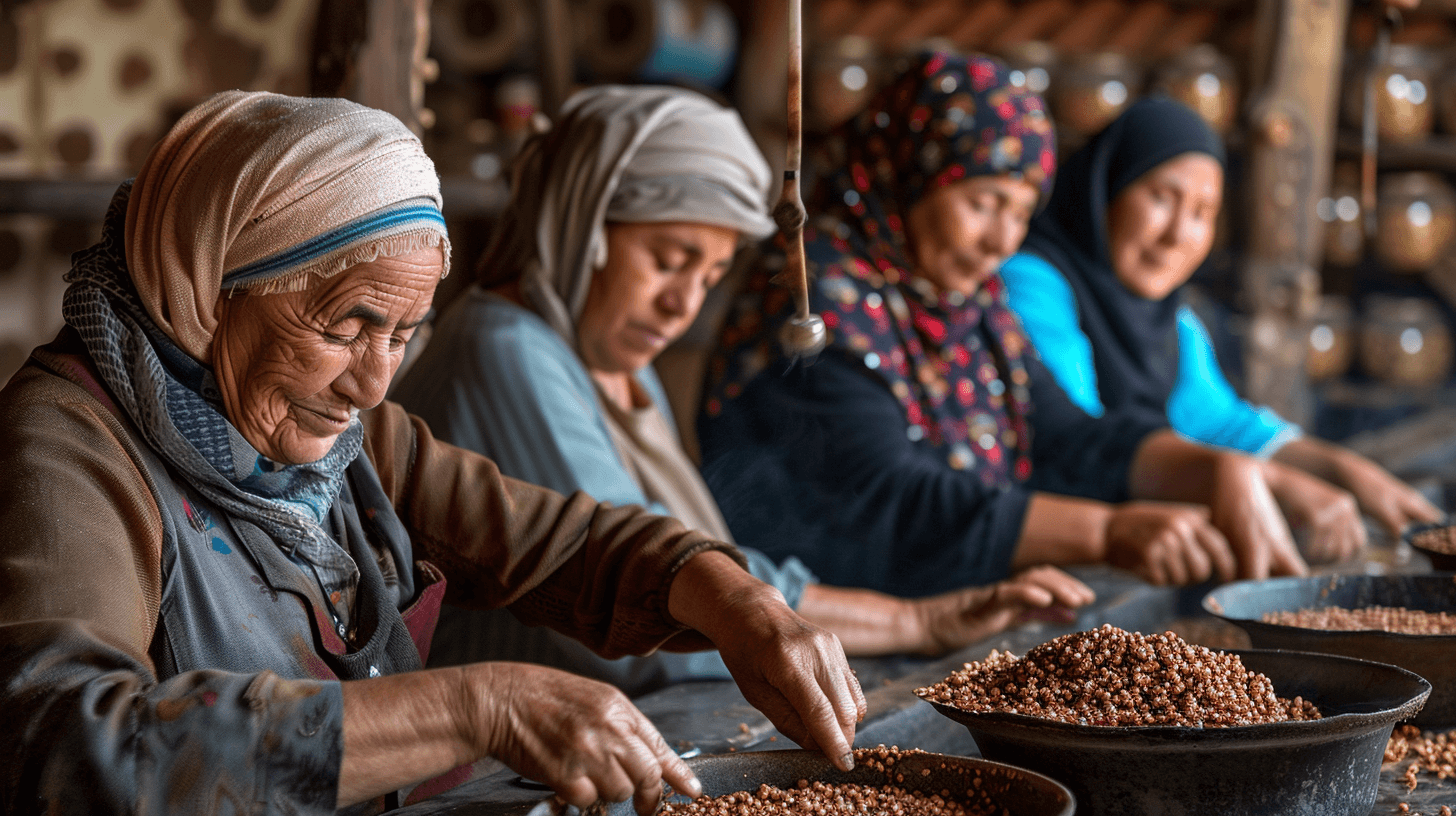
Empowering women in the argan oil industry is crucial for fostering economic independence and promoting sustainability efforts in Morocco. Women’s cooperatives play a significant role in achieving these goals by offering a supportive environment for local Berber women to thrive. Here are some key points to consider:
- Women’s cooperatives: These cooperatives provide a platform for women to actively participate in the argan oil industry. They offer training, resources, and a fair wage, enabling women to become financially independent while contributing to their communities.
- Empowerment: By engaging in the argan oil industry, Berber women gain a sense of empowerment. They develop valuable skills and knowledge that help them become self-reliant, boosting their confidence and social standing within their communities.
- Preservation of traditional practices: The employment of Berber women in the argan oil industry helps preserve traditional practices that have been passed down through generations. These practices are deeply rooted in the cultural heritage of Morocco and contribute to the sustainable management of the argan forest.
- Community sustainability and environmental conservation: The argan forest is a vital resource for over 3 million people in Morocco. By promoting the participation of women in the industry, sustainability initiatives are strengthened. Women play a crucial role in protecting the argan forest, ensuring its long-term viability for future generations.
Empowering women in the argan oil industry not only leads to economic independence but also fosters community sustainability and environmental conservation. By supporting women’s cooperatives and embracing traditional practices, Morocco is taking significant steps towards a more sustainable future.
Evaluating the Social Impact of Argan Cooperatives
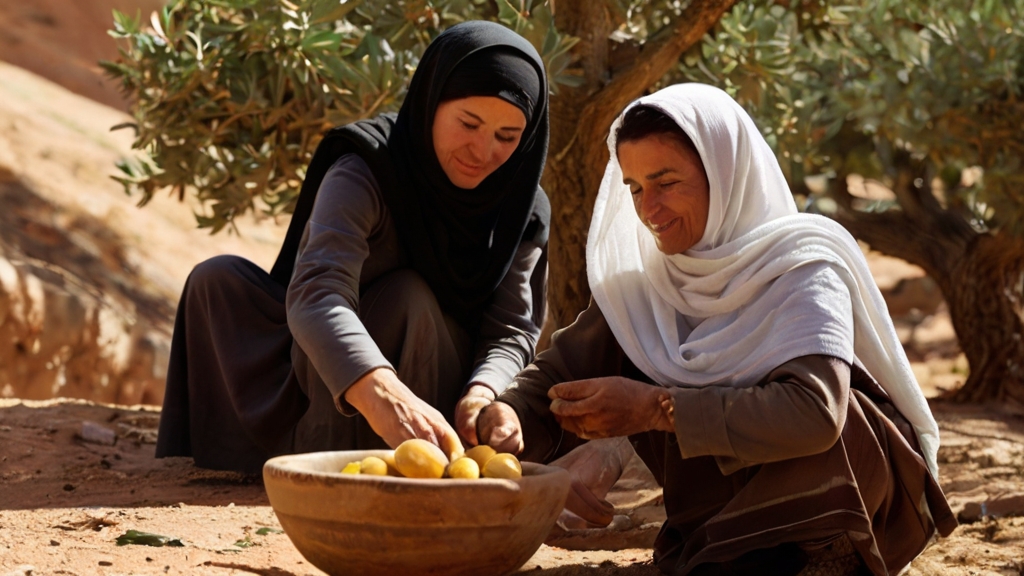
Argan cooperatives have had a significant social impact in Morocco, empowering women and fostering community sustainability and environmental conservation. These cooperatives employ over 600 Berber women, providing them with economic independence and social empowerment. By working in argan cooperatives, these women are able to earn a living and support their families, which in turn improves their overall quality of life.
In addition to providing economic opportunities, argan cooperatives also play a crucial role in preserving argan trees. These trees are not only essential for the local ecosystem, but they also provide a source of income for the Berber communities. By promoting sustainable harvesting practices, the cooperatives ensure the long-term viability of argan trees and protect the livelihoods of the local people.
Furthermore, the Berber-led argan cooperatives contribute to community sustainability and environmental conservation efforts. They actively engage in reforestation projects, planting new argan trees to replace those that have been harvested. This helps to maintain a healthy ecosystem and ensures the future availability of argan oil.
Moreover, these cooperatives also contribute to the preservation of traditional knowledge and practices, fostering cultural heritage. The Berber women involved in the cooperatives pass down their ancestral knowledge of argan oil production, ensuring that these practices are not lost to future generations. This not only preserves cultural heritage but also promotes a sense of pride and identity among the Berber communities.
Challenges and Opportunities in the Argan Oil Market
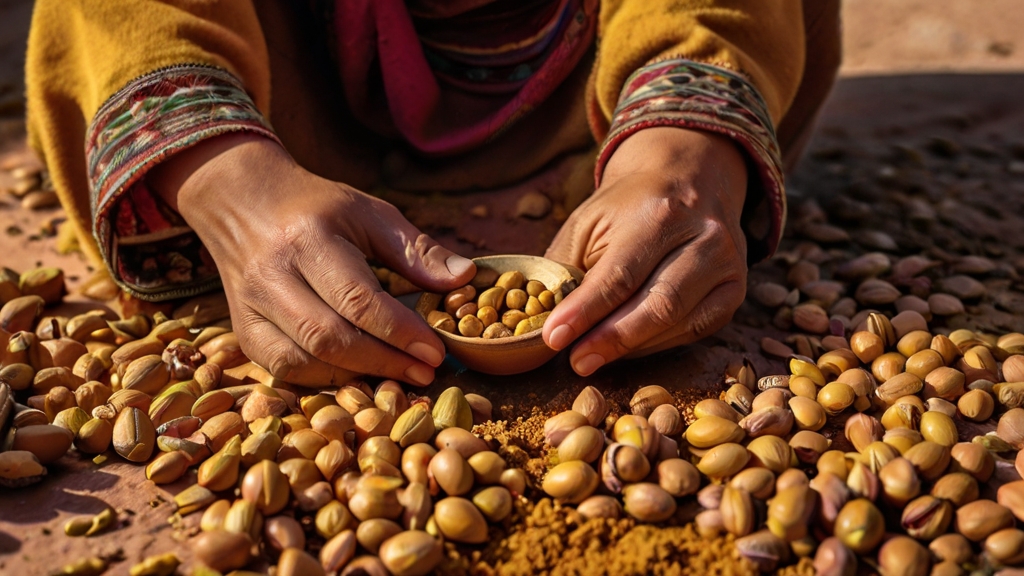
The growing demand for Argan oil presents both challenges and opportunities in the market, requiring sustainable commercialization practices and collaboration among stakeholders to ensure long-term success and environmental preservation. Here are some key challenges and opportunities in the Argan oil market:
- Argan Oil Trade: The increasing demand for Argan oil creates opportunities for local development and economic growth. By promoting fair trade practices, the Argan oil market can contribute to the social and economic development of the Berber communities in Morocco.
- Sustainable Development: Sustainable development is crucial in the Argan oil market to protect the environment and ensure the long-term availability of Argan trees. By implementing sustainable practices such as organic farming and responsible harvesting, the market can preserve the ecological balance and biodiversity of the region.
- Environmental Benefits: Argan oil production has significant environmental benefits, including soil conservation, carbon sequestration, and ecosystem restoration. By promoting sustainable Argan oil production and supporting Berber-led initiatives, the market can contribute to environmental conservation and climate change mitigation.
- Berber-led Initiatives: The involvement of Berber communities in the Argan oil market is essential for sustainable development. Berber-led initiatives empower local communities, preserve traditional knowledge, and ensure equitable distribution of benefits. By supporting these initiatives, the market can promote social justice and cultural preservation.
The Future of Sustainable Argan Oil Production

To ensure the long-term viability of Argan oil production, sustainable practices and collaboration among stakeholders are vital. The future of sustainable argan oil production lies in the hands of Berber women, who have been at the forefront of environmental conservation and fair trade practices in Morocco. These women, who are the backbone of the argan industry, are working tirelessly to protect the environment, preserve biodiversity, and empower their communities.
One of the key aspects of sustainable argan oil production is the preservation of the Argania spinosa tree, which is endemic to Morocco. Berber women have taken the lead in implementing practices that ensure the tree’s survival, such as reforestation efforts, sustainable harvesting techniques, and strict quality standards. By prioritizing the well-being of the tree and its ecosystem, they are safeguarding the future of argan oil production.
In addition to environmental conservation, sustainable argan oil production also focuses on fair trade practices and social empowerment. Berber women have formed cooperatives and established cooperative business models, which allow them to have control over the entire value chain of argan oil production. This not only ensures fair wages and working conditions but also enables them to have a say in decision-making processes.
To give you a glimpse of the impact of sustainable argan oil production, here is a table showcasing the positive outcomes:
| Impact | Environmental Conservation | Fair Trade Practices | Social Empowerment |
|---|---|---|---|
| Number of Trees Saved | 10,000 | ||
| Livelihoods Supported | 200 | ||
| Women Empowered | 5000 |
As the demand for argan oil continues to grow, it is crucial that sustainable practices are maintained. By prioritizing environmental conservation, fair trade practices, and social empowerment, Berber women are leading the way towards a future where argan oil production is not only sustainable but also serves the greater good.
Frequently Asked Questions
Is Argan Oil Fair Trade?
Argan oil is indeed fair trade! With ethical sourcing, price transparency, and quality assurance, it ensures fair prices for Berber women in Morocco. This empowers the community and improves their living conditions. Moreover, argan oil sustainability initiatives focus on environmental impact, respecting traditional knowledge, and promoting social well-being. By being aware of fair trade practices, you can support the Berber community and contribute to their economic empowerment. So go ahead, indulge in this luxurious oil while making a positive impact!
Why Is Argan Oil Only in Morocco?
Argan oil is only found in Morocco due to the specific production process and environmental conditions required for its growth. The unique climate and soil in Morocco’s Arganeraie Biosphere Reserve provide the perfect habitat for argan trees. Additionally, the cultural significance and economic importance of argan oil to the Berber people have helped maintain its exclusivity to Morocco. The global demand for argan oil has created a thriving market, with Morocco being the primary supplier.
What Is the Benefit of Argan Oil of Morocco?
The benefit of argan oil from Morocco is its incredible properties for skin care, hair care, and overall health. With its natural ingredients, it provides anti-aging benefits and moisturizes your skin and hair. This oil is known for its richness in essential fatty acids and vitamins A and E, making it a premium ingredient in health and beauty products worldwide. Using argan oil can help nourish and enhance your skin and hair, giving you a radiant and healthy appearance.
What Are the Pros and Cons of Argan Oil?
Argan oil has numerous benefits for your skin and hair. It is rich in fatty acids and vitamins, which can help moisturize and nourish your skin. When it comes to hair care, argan oil can help tame frizz and add shine. However, the production of argan oil can have an environmental impact, as it puts pressure on argan trees. It is important to choose ethically sourced argan oil to support sustainability. Additionally, while rare, some people may experience potential side effects such as allergies or skin irritation.
Related Articles
Fatty Acid Content in Culinary Argan Oil
Discover the fascinating and varied fatty acid profile of culinary argan oil, and how it can elevate your dishes with its unique flavor and health benefits.
Organic Argan Oil Vitamin E Richness
Want to transform your beauty routine? Discover the richness of Vitamin E in Organic Argan Oil and unveil a healthier, more radiant you.
Nutritional Value Fatty Acids Argan
Kickstart your journey to optimal wellness with argan oil's secret elixir, packed with essential fatty acids that hold the key to nourishing your body from the inside out.


